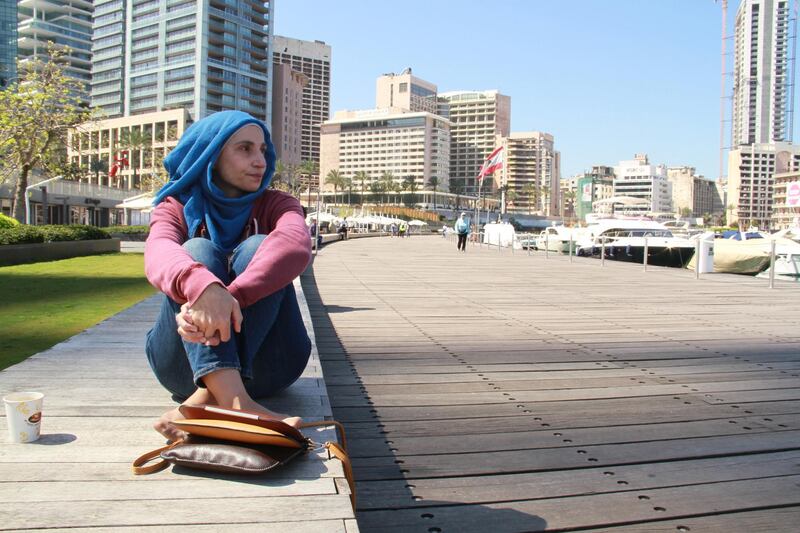The Dubai filmmaker Leen Alfaisal is celebrating the successful premiere of her first feature documentary, The Borrowed Dress, which debuted at the London International Filmmaker Festival of World Cinema last month.
The film is a deeply personal project that follows the journey of Alfaisal's own family as they flee their native Syria to escape the horrors of the civil war engulfing the country and live as refugees in different parts of the world.
Given the film's subject matter, there's a cruel irony in the fact that Alfaisal was unable to attend the London screening due to the difficulty of obtaining a visa, but the director's eyes on the ground in the UK reported back to her after its debut. "All the feedback I've heard was really positive and the people I know who were there have all said it was really well received," she says.
Alfaisal admits that it was tough maintaining an objective stance when making a documentary about such deeply personal issues: "I've only worked on shorts before, and never anything this personal," she says.
“So it was my first feature, and of huge personal significance. I didn’t realise how hard it would be working on something that is your own. I was also camera woman for the film, filming the saddest parts of the story where someone has to leave or is faced with a decision they don’t know what to do with, and it’s difficult because this is my family, they’re my heart and soul. I’d be holding the camera and crying, but at the same time trying to do everything professionally from a documentarian perspective.”
Alfaisal's pain is tangible – some of her family were arrested and imprisoned before they managed to get out of Syria, although thankfully all are safe now. The film follows three generations of her family: her 80-year-old grandmother, Susu, who fled Damascus and moved to Dubai to live with her daughter; Susu's youngest daughter, Doaa, who had been living illegally as a refugee in Lebanon for two years before moving to Norway; and Doaa's son, Saad, who is forced to stay in Beirut without his mother.
Although these specific events of The Borrowed Dress relate to Alfaisal's family, she says her family are a typical, middle-class Syrian family and that their experiences are shared by many. "The film speaks for the millions of families that were shattered and scattered all around the world," she says. "On the one hand, it is a very personal project because it's about my family but it also applies to all the Syrian families this has happened to. This has happened to millions of people who weren't politically involved and had nothing to do with the war."
What is notable about the film's cast is that, without exception, they want to return to Syria despite their terrible experiences of war there, a fact that inspired the film's title. "People want to go back. All the characters in the film, even though some of them are in these amazing countries where they have more rights than home, they still say they want to return because there's nowhere like home," says Alfaisal. "That's where the movie's name comes from, from an old Syrian proverb that says 'a borrowed dress can never warm you like your own'."
Sadly, Alfaisal is not optimistic about the prospects of her family reuniting in Syria any time in the foreseeable future – they are originally from the still besieged area of Ghouta, one of the worst damaged by the war's atrocities. All her family's homes have been destroyed.
It's clear how important it was to Alfaisal to share her story with the world – she worked from scratch to get the project off the ground, slowly picking up parcels of funding as she went along. "We started with nothing but we knew we had to start in order to get anything done when the main character got their relocation application approved to go to Norway. It was now or never as they were the last one left in Syria," she says. "We knew we had to tell the story but didn't have the funds to do it. We resorted to universities sponsoring the film so we could borrow their equipment, then after we'd got things under way and had time we started applying for funding, which is few and far between in the Arab world."
____________________
Read more:
Syrian author Khaled Khalifa on Aleppo: 'There is a resilience in the city'
Charity culinary movement #CookForSyria comes to the Dubai Food Festival
'Syria: A Conflict Explored' exhibition brings to light harsh realities of war
____________________
Alfaisal's fundraising attempts weren't an immediate success. "We only got one fund out of Beirut, so we started with a very low budget," she says. "Then, step by step, we got co-producers on board who offered us editing suites and facilities for post, we signed a deal with a distributor [MAD Solutions] who loved the first cut and really wanted it, and things got better."
Having completed shooting the film in Dubai, Beirut and Damscus, Alfaisal raised a final tranche of funding to complete post-production via a crowdfunding campaign and began the festival submissions. London was the first stop and this month it will screen at Dublin's Silk Road Film Festival. With many more submissions in place or under process, plenty more audiences should be able to see Alfaisal's story.
The Borrowed Dress screens on Thursday at the Silk Road Film Festival in Dublin





